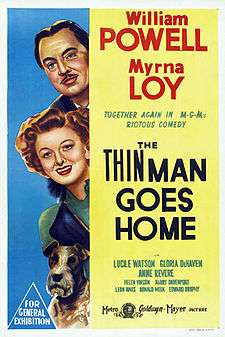The Thin Man Goes Home
| The Thin Man Goes Home | |
|---|---|
|
Theatrical Film Poster | |
| Directed by | Richard Thorpe |
| Produced by | Everett Riskin |
| Written by | Dashiell Hammett (characters) |
| Screenplay by | |
| Story by |
|
| Starring | |
| Music by | David Snell |
| Cinematography | Karl Freund |
| Edited by | Ralph E. Winters |
Production company | |
| Distributed by | Metro-Goldwyn-Mayer |
Release dates |
|
Running time | 100 minutes |
| Country | United States |
| Language | English |
The Thin Man Goes Home is a 1945 motion picture directed by Richard Thorpe. It is the fifth of the six Thin Man films starring William Powell and Myrna Loy as Dashiell Hammett's dapper ex-private detective Nick Charles and his wife Nora. This entry in "The Thin Man" series was the first not directed by W.S. Van Dyke, who had died in 1943.
Plot
Nick and Nora visit Nick's parents (Lucile Watson and Harry Davenport) in Nick's hometown, Sycamore Springs, in New England. The residents are convinced that Nick is in town on an investigation, despite Nick's repeated denials. However, when aircraft factory employee Peter Berton (Ralph Brooks) seeks out Nick and is shot dead before he can reveal anything, Nick is on the case.
An old childhood friend, Dr. Bruce Clayworth (Lloyd Corrigan), performs the autopsy and extracts a pistol bullet. Then, when Nick searches Berton's room for clues, he is knocked unconscious by Crazy Mary (Anne Revere), a local eccentric.
Nora's innocent purchase of a painting for Nick's birthday present turns out to be the key to the mystery. When she shows it to her husband, it brings back unpleasant memories for him, so she donates it to a charity bazaar. When Edgar Draque (Leon Ames) offers Nora a large sum for the painting, Nick wonders why it is so valuable. Nick learns that Draque's wife Helena (Helen Vinson) bought the artwork, but she is knocked out and the painting disappears. Nick discovers that Crazy Mary is Berton's mother and goes to see her, only to come across her lifeless body. Nick and Nora's dog Asta finds the painting in her shack.
Nick puts the pieces together and has the police bring all the suspects to his father's house. (Early on, it is revealed that Nick's father, Dr. Bertram Charles, has never been overly impressed with his son's unusual career choice, so this gives Nick an opportunity to change his father's mind.) Using Dr. Charles's fluoroscope, Nick shows that there is a blueprint hidden underneath the paint. Several people identify it as part of the specifications for a new aircraft propeller worth a great deal to a "foreign power". Berton had copied the blueprints and concealed the copies under five paintings. He had a change of heart and was going to confess all to Nick, but was killed by the spies he was dealing with. Nick has a souvenir World War II Japanese sniper rifle belonging to Dr. Clayworth's brother brought in, and claims it was the murder weapon. Then, after proving that the Draques are members of the spy ring, Nick reveals the identity of its leader: Dr. Bruce Clayworth. Clayworth's first slip was the bullet he showed Nick. Nick knew a handgun bullet would not have the power to penetrate as far into Berton's body as the real one went. Clayworth grabs the rifle. He confesses to the murder, and also to a deep hatred for Nick for always being better than him in their youth. He tries to shoot his nemesis, only to find that Nick had taken the precaution of removing the firing pin. Nick's father is very impressed.
Cast
- William Powell as Nick Charles
- Myrna Loy as Nora Charles, Nick's wife
- Lucile Watson as Mrs. Charles, Nick's mother
- Gloria DeHaven as Laurabelle "Laura" Ronson
- Anne Revere as Crazy Mary
- Helen Vinson as Helena Draque
- Harry Davenport as Dr. Bertram Charles
- Leon Ames as Edgar Draque
- Donald Meek as Willie Crump
- Edward Brophy as Brogan; in the first film he played a character named Joe Morelli
- Lloyd Corrigan as Dr. Bruce Clayworth
- Anita Sharp-Bolster as Hilda (as Anita Bolster)
- Ralph Brooks as Peter Berton
- Donald MacBride as Police Chief MacGregor
- Morris Ankrum as Willoughby
- Nora Cecil as Miss Peavy
- Minor Watson as Sam Ronson
Differences between the book and the film
The background that the movie provides for Nick is totally at odds with the book by Dashiell Hammett. In the book, Nick is of Greek origin. His father changed his surname from Charalambides to Charles to fit a photograph. The type of small town upbringing which is portrayed in the movie is also seemingly at odds with the characterization in the book.
References
External links
- The Thin Man Goes Home at the Internet Movie Database
- The Thin Man Goes Home at AllMovie
- The Thin Man Goes Home at the TCM Movie Database
- The Thin Man Goes Home at the American Film Institute Catalog
